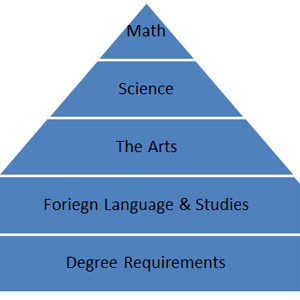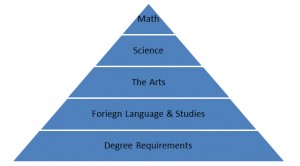
Your education is like food; essential for growth and success. However, you must be cautious of what you eat, because all food isn’t good for you. As such, there is such a thing as a balanced academic diet. You must be sure to take in things from all of the major food groups; math, science, foreign language & studies, art, and of course your core courses to satisfy your degree requirements.

However, what I want to warn you about is not failing to balance your academic diet, but rather biting off more than you can chew! I learned a valuable lesson at the beginning of this semester in watching how I eat (academically that is). I have an academic plan and career goals that I am trying to achieve and so I thought I would add some extra classes to each of my next few semesters to expedite my completion and graduation. My academic throat quickly advised me to “think again!”
No matter how crafty I thought I was, trying to skillfully choose courses that would complement each other and create a synergistic balance, the truth was I had still bitten off more than I could chew! Let’s face it, as adult/non-traditional students school is not our only priority, but likely it’s one of many. As such, we must exercise some wisdom when selecting courses to ensure our success.
So…what does that mean? It means you must give serious consideration to your life and your availability to exercise your commitment to your education before choosing your courses each semester. Some things to consider:
- Know your limits. If you rely on financial aid you may want to first find out how many credits you must be take in order to maintain your financial status (while you’re at it, take note of any academic obligations, such as a certain GPA to maintain, in order to continue receiving the aid you have been awarded). Contact your financial adviser with any questions you have.
- Look for synergy. One thing I did do correctly was planned ahead ALL of the courses I would take and then matched courses in a given semester with those that would complement each other. This way I wouldn’t feel overwhelmed taking multiple classes that were difficult and time consuming at the same time; for example (in my case) math and science in the same semester. Although, taking Intro to Law and Intro to Criminal Justice complement each other quite nicely!
- Act fast. If you see that maybe you have been a little over zealous and need to drop a course don’t hesitate. Try to communicate your concerns with the instructor FIRST, and if that does not solve the problem, contact your academic adviser or go to eLion to drop/late drop the course (be sure to check with financial aid first to ensure that dropping the course will not affect you financially).
Given the 3 academic table manners mentioned above, there is no reason for you to stress or fail to succeed! Bon appetit!




